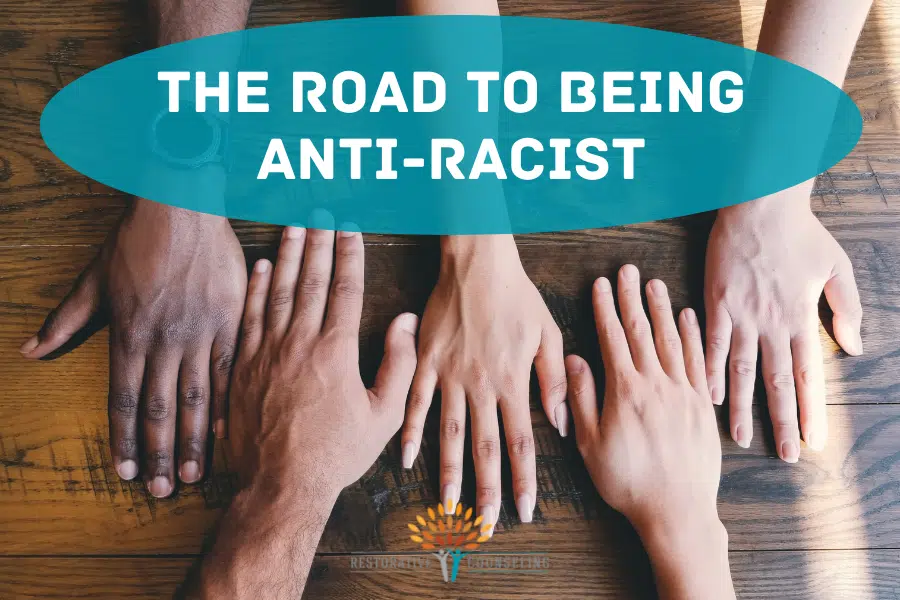Written by Katie Jackson-Griffin, LCPC
Recognizing that race plays a major role in our society
Race can be a very uncomfortable topic to talk about. So much about race is connected to one’s identity:
- How one speaks
- What one wears
- Who one’s friends are
- Where one lives
- How one views the world
Unfortunately, these aspects of identity have been used as a means of oppression, especially for BIPOC (Black, Indigenous, People of Color). Since all people have biases and are part of systems that can be discriminatory, it can be incredibly overwhelming to think about where to start when it comes to dismantling oppression. One way to combat oppression is anti-racism.
You don’t have to do this alone. We are here to support you!
Contact Us Now
Steps towards becoming anti-racist
The road to becoming anti-racist can be challenging but here are some steps that may help:
1. Educate Yourself About Race
Luckily, there are many incredible resources available to learn what being anti-racist means. Being curious is an excellent first step toward making change. There are many avenues to take like reading books, taking courses, engaging with anti-racism social media accounts, and more! Doing the work to find these resources – books, online articles and informational videos – and setting aside the time to educate yourself shows your investment.
Here are several anti-racism educational resources to help you get started:
Free Resources
- Racial Healing Handbook: Being Anti-Racist
- Ted Talk – What I am Learning from My White Grandchildren: Truths about Race
- Embrace Race website
Paid Resources
- “So You Want to Talk About Race” by Ijeoma Oluo
- “The 1619 Project” by Nikole Hannah-Jones
- “Between the World and Me” by Ta-Nehisi Coates
2. Listen
Take opportunities to listen to BIPOC if they choose to share. Their unique, individual experience is incredibly valuable to help you understand how systems of oppression may impact their daily lives. It is essential to remember that your role is to listen and listen only.
If someone is being vulnerable enough to share their experience, it is not for you to agree or disagree. However, it can be tempting to want to make someone feel better by saying things like, “Are you sure it was about race?” or “I’ve had someone be rude to me like that before too.” Comments like these can come across as invalidating, even if well-intentioned. Instead, try saying, “I hear you,” “That must have been difficult,” or “Thank you for sharing that with me.” Additionally, you can lean on your resources to help you further understand something that might have felt confusing to you.
3. Work to get rid of dichotomous thinking
Dichotomous thinking means you think things must be all one way or all the other (i.e., all or nothing, this or that, etc.). This type of thinking leaves no room for multiple ideas to be true or some variation of them combined. Life isn’t so simple that only one perspective is the “right” perspective. Instead, opposing realities can both have components that are true.
This can come up when discussing race because people have the tendency to want to reject a perspective that challenges their own. You may work hard for what you achieve and there are systems of oppression that create roadblocks which prevent BIPOC from benefiting in the same way from the same hard work. Thus, along the journey toward anti-racism, it’s necessary to get more comfortable with these “and” statements. By recognizing that both realities are true, rather than one or the other, you can help reduce natural defensiveness.
4. Accept your discomfort
We all experience discomfort with change – even positive change – but change is necessary to broaden your perspective. You also may experience feelings of guilt or shame regarding unintentional ways you have been participating in racism. This is an expected part of the process! Remember, racism is a systemic problem, and every person has biases, whether you are aware of them or not.
What is most important is that you continue to acknowledge the ways you may have unintentionally participated in racism and push yourself to do something different next time. You may feel helpless and overwhelmed at times. Don’t give up! You’re still making an impact on your community. Change can start with just one person.
5. Engage in self-care
There is no “finish line” to challenging your biases; it’s all about maintenance. You can’t expect yourself to check a completion box and move on. Biases are a part of your identity and a part of society. While this idea can feel daunting to acknowledge, it removes the pressure of needing to complete a task with a defined endpoint. Because challenging your biases is about maintenance, remember to take care of yourself as best you can. Be sure to focus on caring for you so that you can keep progressing towards being anti-racist.
Restorative Counseling is here to assist you in processing your identity
You don’t have to do this alone! The Restorative Counseling team recognizes the importance of processing your identity to help with the journey of becoming anti-racist and combatting oppression. If you are interested in gaining support, schedule an appointment today.

Hi, I’m Katie!
I use HAES and DBT approaches to help people overcome their challenges with low self-esteem, anxiety, and depression. Read more about me.
Follow Restorative Counseling
Sign up for our newsletter

